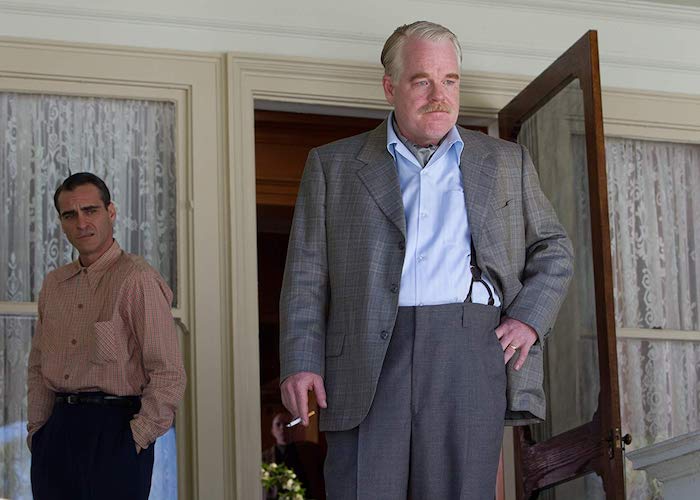
A week or so ago, our Christopher Campbell wrote a piece posing the burning question: What is the Meaning of The Master? The fact is, he isn’t the only one asking. Some have harshly compared writer/director Paul Thomas Anderson to the film’s “titular” cult leader, believing Anderson also has no clue what he’s trying to say. Campbell theorized, “Maybe the reality is that there is nothing there. And yet maybe that lack of meaning is in fact its meaning,” but then went on to discount that interpretation of the film’s point, along with others. What is Anderson trying to say about religion? Is he saying, as Campbell speculates, that it’s all meaningless?
In simple reality, to the obvious disappointment of many, is that Anderson is attempting to do no such thing.
Even as it attempts ephemeral whatdoesitallmean-ness, The Master can be broken down to one simple sentence: a beautiful, tragic friendship between someone who has no interest in answers and a man who knows he has none of them. It’s solely a story of two distinct men, Freddie Quell (Joaquin Phoenix) and Lancaster Dodd (Philip Seymour Hoffman). Some could argue that’s too simplistic of a story for Paul Thomas Anderson, but Anderson has never been a “message” filmmaker. He’s always been a “relationship” filmmaker. The Master strives to be nothing more than another character study from Anderson told on a big, bold, beautiful canvas, not a hard-hitting critique of religion.
When the main character loves him some fart jokes and imagining a room clouded by naked women, it wouldn’t feel right if the film started exploring major life questions, since its own main character would never have the thought of committing such an empty act. Freddie is a child, both emotionally and mentally. He doesn’t see beyond his own existence, and that’s his advantage.
Freddie could care less about why the world is the way it is. He’s not a believer in Dodd’s cult-like society The Cause. When someone asks him what he thinks of Dodd’s new book, you know right away he hasn’t read a page of it. He doesn’t know or care what it says. All he knows is that his buddy wrote it, one of the few people who’s ever given him a chance, and that support matters. To a point.
At first, that chance is out of condescension. Dodd sees Freddie purely as an animal, the sailor serving as the dragon the charismatic leader spoke of from his dream. He’s trying to wrestle both the dragon and Freddie down, but by the end, Dodd fails Freddie. The wild spirit isn’t a man who can be saved, and the final shot shows he hasn’t changed since frame one, despite Dodd’s efforts. However, Freddie can’t be saved because he doesn’t require saving. At least not from men like Dodd.
Dodd is not “The Master” by the end of the film. He never was, and perhaps he comes to see that. He more than likely once believed he had the answers to life’s greatest mysteries, but after snapping at a questioning follower, played by Laura Dern, he’s stopped drinking his own Kool-Aid. He’s tired and frustrated, wishing he could live Freddie’s life. He envies a man who never worries about his place in the world or what it all means. Freddie doesn’t have to answer those questions, but Dodd seems doomed to.
The conclusion is simple: Freddie is The Master. Dodd needs Freddie far more than Freddie needs him. After their relationship perishes, Freddie goes on living his life as a drifter, as if his encounter with Dodd was another drunken binge. It’s another part of his life he’ll one day forget, but it will haunt Dodd, breathing fire down his neck and snapping at his subconscious. Anderson tells us in their first scene together none of this is going to work out. Right from the beginning, Dodd pegs Freddie all wrong. He calls Freddie a “hopelessly inquisitive man,” except he is nothing of the sort. Freddie doesn’t need a master to live his life. All he needs is a beach he can draw a naked woman on and cuddle up next to. Dodd – whether because he seeks so aggressively to become one or because he genuinely needs one himself – can’t understand a Master-less existence.
As chaotic as Freddie’s state of mind is, he has this life figured out. Dodd is the lost one who needs guidance. The final minutes show the cult leader will always wear an artificial mask, while Freddie will continue on his childlike and comfy routine, never having to hide who he is.
In a nutshell, that’s all The Master is: an unlikely friendship doomed from the start.
Related Topics: Amy Adams

